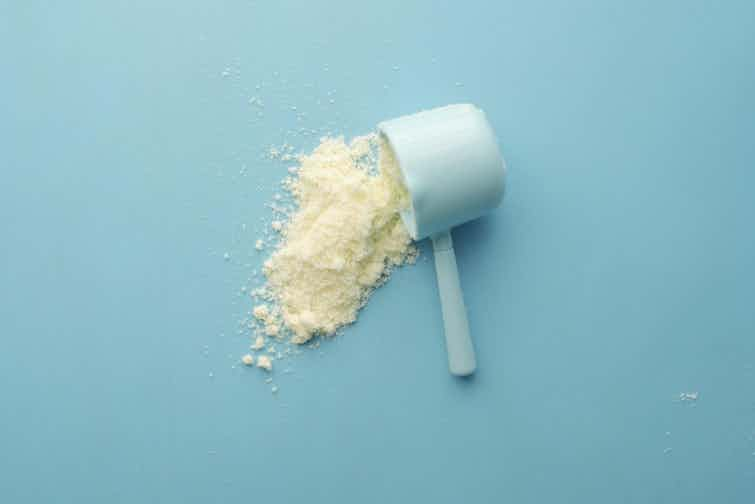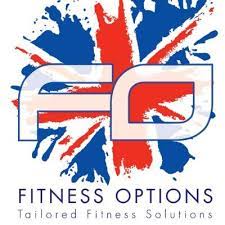Creatine monohydrate is the most well-researched sports supplement globally and has been a cornerstone of sports nutrition since the 1990s. Bodybuilders popularised it initially, but now it's commonly used in recreational fitness to gain muscle mass and engage in high-intensity workouts. But is creatine monohydrate safe to consume after 50?
Ready to transform your life? Whether you're looking for a new pair of running shoes or some shiny home gym equipment, you can find everything you need to fuel your fitness journey with our partner brands.
What is creatine monohydrate?
Creatine is a naturally occurring chemical compound found in the body (produced in the liver and stored primarily in muscle cells). You can find it in meat, dairy, and fish, which are all part of your diet. Because of this, vegetarians and vegans tend to have lower levels of creatine in their bodies than meat eaters and respond better to supplementation.
Creatine is technically an amino acid, but it is not one of the amino acids we use to build protein in our body, so it’s easier to think of creatine as a chemical compound. Creatine’s primary role is to generate energy for high-intensity exercise. Phosphocreatine contains phosphate groups that help create Adenosine Triphosphate (ATP). ATP is integral to energy production, and we use it immediately when we need energy.
If you are sprinting, for example, releasing phosphate from creatine creates ATP, generating more energy for your body to use during that 100m race.
Creatine is essential for intense cognitive activity and is currently being researched for potential cognitive benefits.
What are the benefits of creatine monohydrate?
There are numerous benefits to taking creatine supplements, most of which are related to enhancing physical performance. Increased muscle growth and strength are the most common reasons people purchase pure creatine monohydrate.
You can achieve this at a very affordable price, as creatine monohydrate is one of the cheapest supplements available at the checkout counter.
Improved sporting performance
There is a reason why creatine is the most popular supplement among professional athletes. Not only can creatine help increase power, but it can also increase strength, muscle size, and endurance.
A study in 2001 found that creatine monohydrate combined with resistance training led to significant increases in power, strength, muscle mass, and an increased metabolic rate in untrained men within 28 days of use. The study also found an improvement in blood cholesterol levels and blood flow.
Studies have also found that creatine can improve anaerobic performance (exercising without oxygen). A study in the Journal of Strength & Conditioning Research found that creatine supplementation led to significant anaerobic performance improvements in women (21%) who participated in a critical power test.
There is also evidence that creatine can help to slightly increase muscular endurance, but only during intense aerobic exercise. This can be highly beneficial for most sports and long-distance cardio.
If your sport requires power, strength, or muscular endurance, creatine can help. This applies to sports popular with people over 50 (tennis, golf, pickleball, squash) and all common sports (football, basketball, soccer too.
It is also massively useful for anyone looking to improve exercise performance. This includes weight training, resistance machines, callisthenics, or cardiovascular exercises such as running, swimming, and cycling.
May prevent or treat type II diabetes
There is evidence that creatine monohydrate supplementation increases glycaemic control, helping to lower blood sugar levels by improving the body’s ability to shuttle blood sugar to your muscles after a meal. Therefore, combining creatine with regular exercise can aid in the prevention of type II diabetes.
Improved body composition
It’s debatable whether creatine is helpful for weight loss. In the short term, it can lead to weight gain as your body holds onto more water than usual. But it can also allow you to train at a higher intensity, meaning you will burn more calories.
Creatine also has the potential to be very anabolic, meaning it can aid in building additional muscle mass. This can improve your overall body composition, resulting in a leaner and more muscular physique.
Increased cognitive performance
Creatine was previously considered purely a sports supplement, helping people to grind out more reps during their workout. But in recent years, its ability to improve cognition has become increasingly of interest.
Many supplements claim to enhance cognition, but these often only apply to people with cognitive impairment. Creatine appears to help people who are not suffering from cognitive impairment, and it also seems to help people of all ages.
A 2007 study found that creatine supplementation helped increase alertness in people in their 30s and 40s. Another study has found that creatine can help to deliver more oxygen to the brain (known as cerebral oxygenation), which reduces mental fatigue and allows you to think clearly.
Creatine can improve mood and reduce mental fatigue. This is the main reason creatine effectively improves cognition, allowing you to think clearly and focus better on tasks.
Protects against age-related diseases
If you are over 50 and considering whether to take creatine, this section may be the most important. There is evidence creatine can help reduce the risk of age-related diseases and conditions that are more common in adults aged 50 or older.
Osteoporosis
Our bone density can decline dramatically as we age, particularly in women. There are many ways to address this, and exercise is fantastic. But there is evidence that creatine supplementation can also help to increase bone density.
Combining creatine monohydrate and regular resistance exercise is a fantastic way to help prevent osteoporosis or slow it down.
Low testosterone
Both men and women will see declines in sex hormones as they age. While women are aware of menopause, men are less aware of the drop in testosterone production accompanying each birthday.
There are several downsides to declining testosterone levels, including:
- Increased body fat accumulation.
- Reduced muscle mass.
- Increased stress.
- Bad sleep.
- Libido issues.
Luckily, many ways to reverse this decline include sleeping better, exercising regularly, managing stress, and losing weight. Creatine may also be able to help.
A 2004 European Journal of Applied Physiology study found that combining creatine supplementation with strength training led to significantly higher testosterone levels than strength training alone.
It is unlikely that creatine alone would boost testosterone production, but if you exercise, it may help boost your testosterone levels. It is well worth considering.
Fatigue
Fatigue can impact individuals of all ages, although it is more common in older individuals. Creatine has a fantastic ability to reduce both physical and mental fatigue. Studies have shown that creatine can reduce fatigue symptoms, boost your mood, and help you resist fatigue better.
Depression
As with fatigue, depression is not age-related, but older people are more susceptible to it. There is evidence that creatine can help people with depression ranging from mild to major, though, of course, you should always speak to a doctor before trying to combat depression with any supplement.
Osteoarthritis
While creatine may not cure osteoarthritis, there is evidence that it can help restore functionality in affected areas. A 2011 study found that creatine supplementation helped to improve functionality in the knees of post-menopausal women with knee osteoarthritis.
Fall risk
While fall risk isn’t technically an age-related disease, it is a serious issue that affects people as they age. Studies have found that creatine supplementation can help improve functionality in older people, allowing them to be firmer on their feet and more independent.
Different forms of creatine supplements
Creatine monohydrate powder is the most affordable supplement available. However, expensive alternatives on the market often claim to be superior.
Micronised creatine is a good example of that. This is creatine that is supposed to be easier to absorb. As our bodies easily absorb standard creatine, micronised creatine may not be needed. That being said, you are welcome to try if you have the money!
Creatine monohydrate powder
You will unlikely find a better value-for-money supplement than unflavoured creatine monohydrate powder. It’s incredibly cheap and effective, and you can combine it with other supplements such as beta-alanine, whey protein, or even caffeine, depending on your goals.
Creatine monohydrate pills and gummies
The only downside to unflavoured creatine powder is that the texture and taste may not always be appealing. Creatine pills are an option, but not everyone likes swallowing pills. One option is creatine gummies, which contain a standard dosage of creatine and taste and feel like sweets.
Creatine and whey protein powder
It is common to find creatine and whey protein shakes sold together due to their benefits and potential synergistic effects. It may make more financial sense to purchase the two separately and combine them in a shaker. But it would make even more sense to keep them separate as you should take creatine every day, yet you may only want to take a protein shake some days.
Are creatine supplements safe?
Many athletes consider creatine a safe supplement with minimal side effects, and none are considered dangerous. It is also one of the few supplements where you can consciously decide to avoid the side effects by changing how you use it. Most side effects result from creatine loading, something you can easily avoid.
Side effects of creatine monohydrate
Here is a short list of the most common side effects of taking creatine monohydrate. As mentioned above, these are caused mainly by creatine loading:
- Nausea.
- Upset Stomach.
- Headaches.
- Water Retention.
Dehydration causes nausea, headaches, and upset stomachs. When people start loading creatine monohydrate, it draws water from your body and sends it towards your muscles. This can lead to your muscles feeling larger for a couple of weeks.
You need to increase your water intake to address this issue, which can help prevent or lessen the side effects listed above.
However, if you take a steady dose of creatine over time rather than loading (don’t worry if this doesn’t make sense yet, we will cover it in the next section), you can avoid this issue. Also, drinking more water will make a huge difference.
Water retention is another side effect that is much more common when you load creatine. But it will affect anyone taking creatine for at least a week. All that happens is that you may feel a bit “puffy” for a few days as you retain more water than usual. It’s not real weight gain and will subside after a week or so; whether you consider that a side effect or not is up to you!
Is creatine monohydrate supplementation safe for over 50s?
If taken correctly and with proper hydration, creatine should not adversely affect individuals over 50. Some may argue that those over 50s have more to gain from creatine supplementation than those under 50, and the risks of taking creatine are no higher.
One consideration for those over 50s is whether creatine will interact with your medications. If you take any medication for blood sugar levels, or liver or kidney issues, you should consult your doctor before taking creatine.
It is important to note that creatine does not affect the liver or kidneys. There is currently no evidence to support this belief, but if you suffer from liver or kidney problems, consult your doctor first.
Creatine is very safe to consume and safe for children, adults, and older people.
How to take creatine monohydrate as a dietary supplement
There are two ways to take creatine monohydrate, loading or non-loading. Both have their advantages and disadvantages. But for most people, there is a better option.
Loading phase vs non-loading
Here's how creatine supplementation works: your muscles store naturally produced creatine, which helps you exercise harder. By taking creatine supplements, you aim to saturate your muscles with even more creatine to enhance your workout performance.
The fastest way to do this is loading, where you take very high doses of creatine for several days and then drop the dosage once your muscles are full. This works quickly but is responsible for a lot of the side effects.
Non-loading works more slowly but provides a much smoother experience. All you do with non-loading is take a standard daily dosage for up to 18 months (after that, give yourself a 30-day break before resumption). After 30 days, your results will be identical to those of someone loading, and you will have avoided any unpleasantness.
Hydration considerations
Because creatine can dehydrate you, particularly if you are loading, you will want to increase the water you drink daily. You don’t need to do anything drastic; just add a few glasses to your day. You may not need to increase your intake if you drink lots of water anyway, just pay attention to how thirsty you are, and don’t ignore that.
What is the ideal dosage?
- If you are loading, the dosage is usually 25 grams daily for the loading phase (one week), followed by 2.5 grams daily.
- Non-loaders should take 5 grams per day for as long as you want.
Should you take creatine pre-workout or post-workout?
There has been a lot of debate about this in fitness circles, but it doesn’t matter. As you can see, creatine is about filling your muscles with it over time.
Some argue that taking it post-workout will lead your muscles to take up more creatine and become saturated faster. But it won’t make any difference over 30 days. Just find the ideal time to take it and stick to that.
Creatine after 50: what you need to know
As a person ages, creatine monohydrate can be a highly effective supplement. Despite its many benefits to both physical and mental health, it is not commonly used. The supplement is affordable, has few side effects, and offers numerous advantages. Consider selecting a trustworthy brand to add creatine to your daily routine for optimum nutrition.
Image Credit: Towfiqu barbhuiya at Pexels









